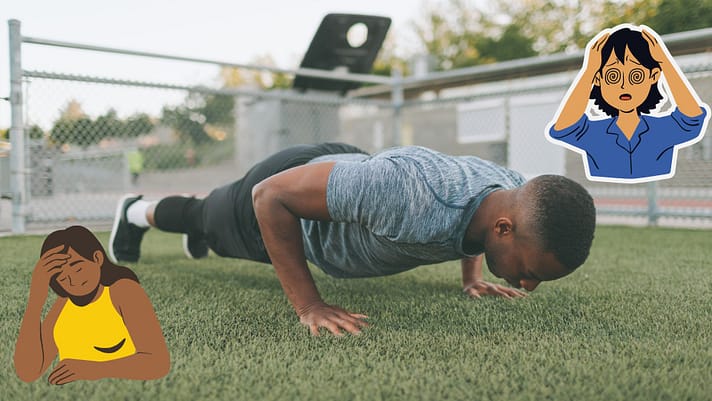There are several reasons why push-ups may make you dizzy. Here are 5 possible causes then I explain: overexertion, holding your breath, dehydration, inner ear problems, or low blood sugar. If your dizziness persists or is severe, you may want to consult with a doctor or healthcare professional.
When you exercise, your muscles require more oxygen to perform the physical activity.
This increased demand for oxygen leads to an increase in your breathing and heart rate to supply more oxygenated blood to your muscles.
If you push yourself too hard during exercise, your muscles may require more oxygen than your body can deliver.
This can cause a buildup of lactic acid in your muscles, which can lead to muscle fatigue and cramps.
Furthermore, overexertion can cause a drop in blood pressure.
This is because when you exercise, blood is redirected away from non-essential organs, such as your digestive system, and towards your muscles.
This redirection of blood can cause a temporary decrease in blood pressure, especially if you’re not used to exercising or if you’ve been exercising for a long time without taking a break.
A drop in blood pressure can cause dizziness, lightheadedness, and even fainting.
This is because your brain requires a constant supply of oxygen and glucose to function properly.
If your blood pressure drops too low, it can reduce the flow of blood to your brain, which can cause these symptoms.
Therefore, it’s very important to listen to your body during exercise and not push yourself too hard.
Gradually increasing the intensity and duration of your workouts can help your body adapt to the increased demands of exercise and prevent dizziness and other symptoms.
Taking breaks, staying hydrated, and maintaining a balanced diet can also help prevent overexertion and its associated symptoms.

Holding your breath.
When you hold your breath while doing push-ups, your body is not able to take in fresh oxygen and exhale carbon dioxide as effectively as it should. This can lead to a buildup of carbon dioxide in your bloodstream, which can cause a condition called hypercapnia.
Hypercapnia is characterized by an increase in the levels of carbon dioxide in your bloodstream. This can cause a variety of symptoms, including dizziness, lightheadedness, shortness of breath, confusion, and even unconsciousness in severe cases.
Carbon dioxide is a waste product produced by your body’s metabolism. When you inhale, you take in oxygen, which is used to produce energy in your cells. The waste product of this energy production is carbon dioxide, which is then exhaled from your body.
When you hold your breath, your body is not able to get rid of the carbon dioxide that has built up in your bloodstream.
This can cause the levels of carbon dioxide to increase, leading to the symptoms of hypercapnia, including dizziness and lightheadedness.
Therefore, it’s very important to breathe properly during exercise, especially during high-intensity activities like push-ups.
Inhaling deeply and exhaling fully can help ensure that your body is getting enough oxygen and is able to get rid of
excess carbon dioxide, helping to prevent dizziness and other symptoms.
Dehydration.
When you exercise, your body loses water and electrolytes through sweating, which can lead to dehydration if you don’t drink enough fluids to replenish what you’ve lost.
Dehydration can cause a decrease in blood volume, which means there is less blood circulating in your body. This decrease in blood volume can cause a drop in blood pressure, leading to dizziness and lightheadedness.
The decrease in blood volume can also affect the delivery of oxygen and nutrients to your muscles and organs. This can cause muscle fatigue, cramping, and other symptoms, which can make it more difficult to continue exercising.
In addition to dizziness, dehydration can cause other symptoms, such as thirst, dry mouth, dark urine, fatigue, and headaches.
In severe cases, dehydration can cause more serious symptoms, such as rapid heartbeat, rapid breathing, confusion, and even unconsciousness.
Therefore, it’s very important to drink enough water before and during exercise to prevent dehydration and its associated symptoms.
The amount of water you need depends on various factors, such as your body weight, the intensity and duration of your workout, and the temperature and humidity of your environment.
As a general guideline, you should aim to drink about 17-20 ounces of water 2-3 hours before exercise, and about 7-10 ounces of water every 10-20 minutes during exercise to stay hydrated.
Inner ear problems.
The inner ear plays a crucial role in our sense of balance and orientation in space.
The inner ear contains tiny structures called semicircular canals, which are filled with fluid and sensitive hair cells.
When we move our head or body, the fluid in the semicircular canals moves, which stimulates the hair cells and sends signals to the brain about our movement and position.
Inner ear problems, such as vertigo, can disrupt this system and cause dizziness, especially during exercise.
Vertigo is a condition characterized by a sensation of spinning or whirling, even when you’re not moving.
This can be caused by various factors, such as inflammation or infection of the inner ear, or displacement of tiny crystals in the inner ear.
When you exercise, the movement and changes in position can exacerbate inner ear problems and trigger dizziness.
This is because the inner ear is responsible for detecting changes in head position and movement, and when this system is disrupted, it can cause conflicting signals to be sent to the brain, leading to dizziness and vertigo.
In addition to dizziness, inner ear problems can cause other symptoms, such as nausea, vomiting, hearing loss, and ringing in the ears.
If you suspect that you have an inner ear problem, it’s very important to see a doctor or an ear, nose, and throat specialist for diagnosis and treatment.
In some cases, inner ear problems can be treated with medication, physical therapy, or surgery, depending on the underlying cause.
Low blood sugar.
When you exercise, your body needs energy to power your muscles and sustain your physical activity.
This energy comes from glucose, which is a type of sugar that your body converts from carbohydrates in your diet.
However, if your blood sugar drops too low during exercise, it can cause a condition called hypoglycemia, or low blood sugar.
Hypoglycemia can cause a variety of symptoms, including dizziness, lightheadedness, weakness, confusion, and even fainting.
Low blood sugar can occur for various reasons, such as not eating enough before exercise, taking too much insulin (if you have diabetes), or exercising for too long without eating or drinking.
When your blood sugar drops too low, your brain and muscles may not have enough energy to function properly, leading to the symptoms of hypoglycemia.
Dizziness and lightheadedness can occur because your brain is not getting enough glucose to function properly, which can affect your balance and coordination.
If you experience symptoms of hypoglycemia during exercise, it’s very important to stop and rest, and eat or drink something that contains glucose, such as fruit juice or a sports drink.
If you have diabetes, it’s very important to monitor your blood sugar levels before, during, and after exercise, and adjust your insulin or diet accordingly.
In general, it’s VERY important to eat a balanced meal or snack before exercise, and to stay hydrated by drinking water or other fluids. This can help prevent low blood sugar and its associated symptoms, including dizziness.
Here’s a chart table with 20 possible reasons why push-ups may cause dizziness and some potential fixes:
Reason |
Fix |
|---|---|
| 1. Poor form or technique | Ensure proper form, engage core muscles, and keep head in neutral position |
| 2. Holding breath during exercise | Breathe regularly and deeply throughout the exercise |
| 3. Overexertion or pushing too hard | Start with easier variations or fewer reps, gradually increase intensity |
| 4. Dehydration | Drink water before and during exercise |
| 5. Low blood sugar | Eat a balanced meal or snack before exercise |
| 6. Low blood pressure | Stand up slowly and take breaks if feeling dizzy |
| 7. Inner ear problems | See a doctor or ENT specialist for diagnosis and treatment |
| 8. Anxiety or stress | Practice relaxation techniques or seek professional help |
| 9. Medication side effects | Talk to your doctor about adjusting dosage or switching medications |
| 10. Vestibular migraines | See a neurologist for diagnosis and treatment |
| 11. Postural orthostatic tachycardia syndrome (POTS) | See a cardiologist or specialist for diagnosis and treatment |
| 12. Anemia | Increase iron intake through diet or supplements |
| 13. Hyperventilation | Focus on breathing slowly and deeply |
| 14. Heat exhaustion | Rest in a cool, shaded area and drink water |
| 15. Overheating | Wear breathable clothing and exercise in a cool environment |
| 16. Alcohol or drug use | Avoid exercise while under the influence |
| 17. Lack of sleep | Get adequate rest and sleep before exercise |
| 18. Caffeine withdrawal | Gradually reduce caffeine intake or consume caffeine before exercise |
| 19. Ear wax buildup | See a doctor or ENT specialist for cleaning |
| 20. Other underlying medical conditions | See a doctor or specialist for diagnosis and treatment |
It’s very important to note that dizziness during exercise can have various causes, and it’s not always related to push-ups specifically. If you experience persistent or severe dizziness during exercise, it’s very crucial to see a doctor or specialist for diagnosis and treatment.
Conclusion
Dizziness during exercise can be a frustrating and even frightening experience, but it’s very important to remember that it’s often preventable and treatable.
By understanding the common causes of dizziness during exercise and adopting some simple strategies, such as staying hydrated, maintaining proper form, and increasing intensity gradually, you can minimize your risk of experiencing this symptom.
If you do experience dizziness during exercise, remember to take a break, breathe deeply, and seek professional help if needed.
With the right approach, you can enjoy the many benefits of exercise without the discomfort of dizziness.
Sources:


